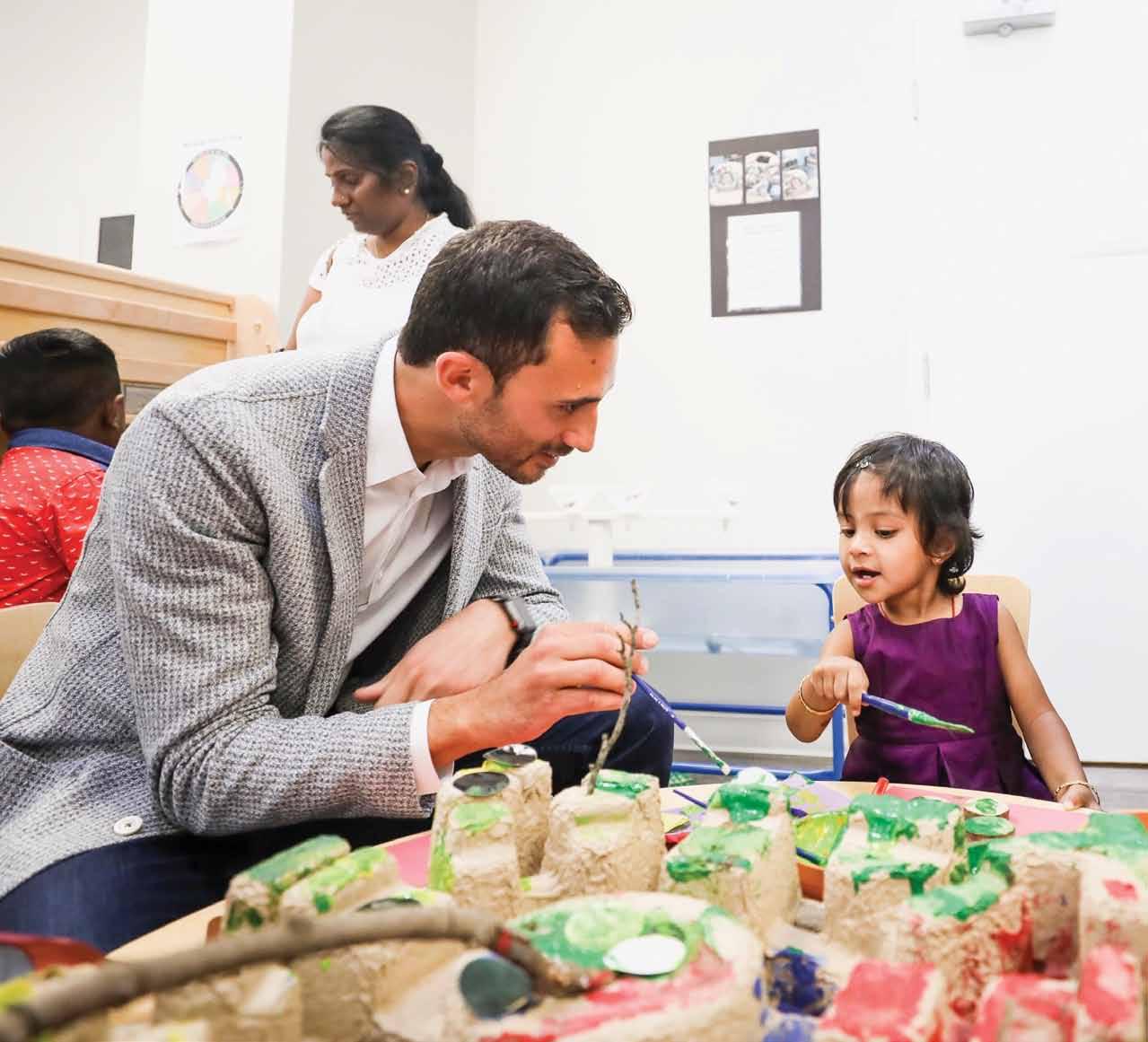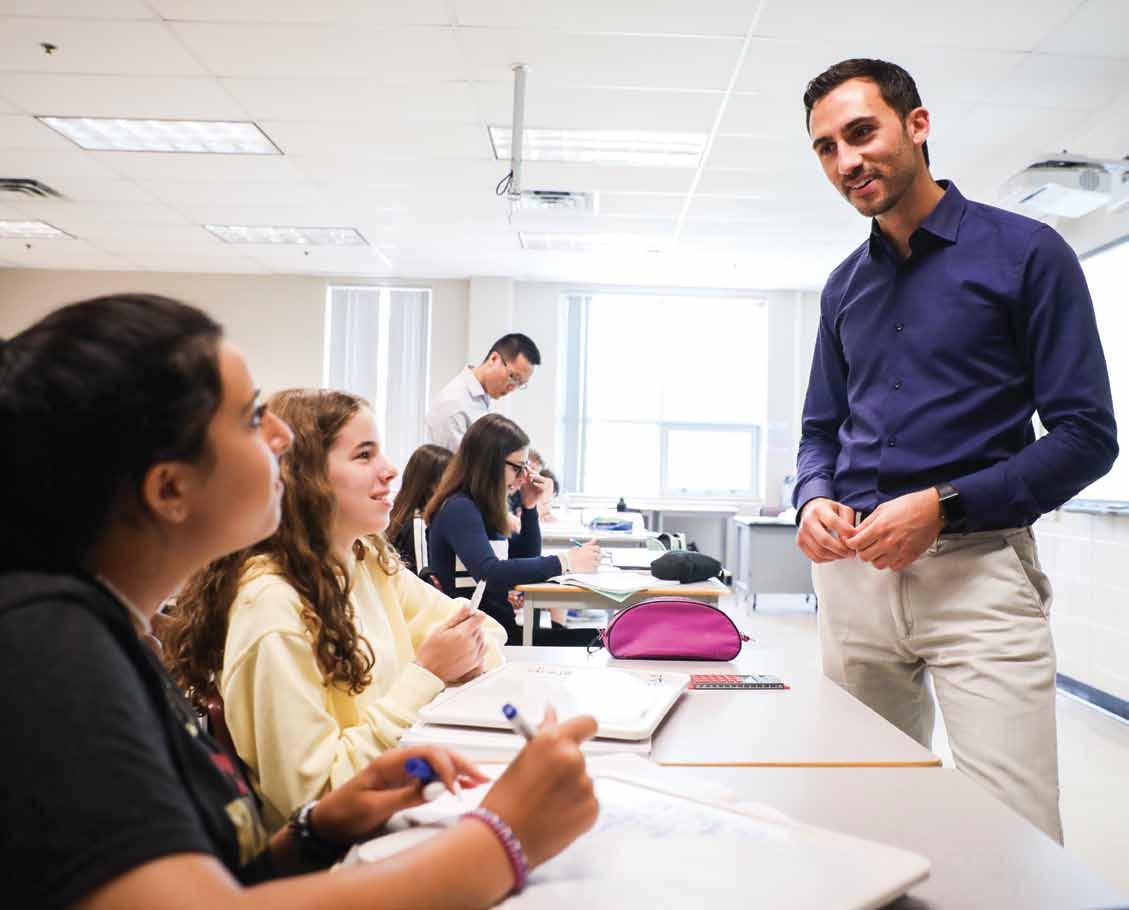
6 minute read
Seeking Collaboration: The new Minister has lots of priorities on his plate
By Peggy Sweeney
Stephen Lecce was born in Vaughan, Ontario, to immigrant parents who came to Canada from southern Europe. “Their aim, which is very much the aspiration for many newcomers today, was to make sure their children could have a better life. They recognized that … there weren’t many economic opportunities for them in that part of the world.
Advertisement
Lecce recalls his elementary school as “a wonderful community with a very hardworking, decent group of educators who created a family, a real culture of support for their students. I remember very fondly my kindergarten teacher, who really is the epitome of a nurturing soul, incredibly committed to her students. She treated us like her own and had a very positive relationship with the community and the parents. She inspired the kids to learn at a very young age and developed a real zest for learning, for reading, literacy and numeracy at an early age. I’m eternally grateful for the commitment that those educators made to the young people they educated and the communities that they served in.”
Following high school, Lecce attended Western University in London where he studied political science. He also took on his first elected political role there as the President of the University Student Council. After his graduation, he moved to Ottawa, where he became involved with the Canadian Alliance of Students Association. In that role, he attended a meeting with then Prime Minister Stephen Harper. The relationship was a positive one and the Prime Minister hired Lecce, who spent the next five years serving in the PMO, working his way up to the role of Director of Media Relations. After the Harper government was defeated in 2015, Lecce returned to Vaughan and started his own private consulting firm. But he had been bitten by the political bug. In 2018, he was elected as the MPP for the riding of King-Vaughan. He was appointed as the Parliamentary Assistant to the Minister of Infrastructure and then took on the same role for the Premier. When the Cabinet was shuffled in June, 2019, Lecce was appointed as the Minister of Education, the youngest to serve in that role in Ontario’s history. “I was extremely humbled by the prospect of having carriage for two million young people in the province of Ontario. One side of me recognized the vast challenges that exist within the ministry, within any ministry. But I also saw the incredible opportunities that lie in the horizon to transform this ministry, to give young people greater opportunities to achieve their potential. So, I was quite motivated then as I remain today.”

As he begins his first year in the role, Lecce has a number of initiatives that he wants to pursue. The first is STEM/STEAM. In July 2019, Lecce and the Alberta Minister of Education signed an agreement to enhance learning opportunities for students. “By increasing educational opportunities for our students in the STEM and skilled trade sectors, we are giving them the tools they need to be successful from the classroom, to the board room to the shop room.
“In Ontario, I believe we’ve got incredible capacities in the arts and their important economic driver. I’m a music student myself, so I value the arts. However, I recognize that from an area of improvement – and I say this constructively – from an area of professional development for the ministry, where we do better for parents and for their children is improving the science, technology, engineering and math elements.
“Those are the areas where I think there’s deficiency where we can do better. And with a greater emphasis in the curriculum, with more resources in the classroom and with a modernized review of those core competencies, I think we could better enrich young people to understand and apply that knowledge both in the classroom and in the workforce.”
Another initiative is financial literacy. “Our government announced a $200 million, four-year math strategy. There is a new resource in the classroom to better support young people in their journey, learning the context of numeracy, which is so foundational in their lives.
“Part of those dollars are to flow to educators to get the right professional development so they are better prepared, better able to educate and inspire young people in the competency of math. We are in the first year of that plan. I want to build upon that investment and make sure that it’s reaching the students and the educators that we’ve designed the plan for, with the goal of trying to improve math outcomes and knowledge that is critical for science and critical for any other competencies.”

One of the concerns principals and vice-principals have expressed over the past year is the government’s autism strategy. Initially, the government announced changes that would provide funding for children with ASD based on family income and age. After many months of protests and concerns from families, caregivers and service providers, the government announced a revision back to providing funding based on need.
Whether some children will be spending more time in school as a result, instead of in community-based one-on-one programs, is still unknown. The OPC has asked the government to provide additional resources to schools, for trained professionals who can work with these children, if the time spent in school does increase. Currently, the specialized staff available in schools will not be able to meet the needs of additional students.
“I was very pleased to be part of the announcement with Children, Community and Social Services Minister Todd Smith about the collaborative approach across ministries to break down silos and create a seamless transition to a needs-based program for these young people. And that includes in the class and outside of the classroom effective this year, which will be very much supported this September. We have more than doubled the funding allotment for children with ASD. And we have increased special education funding to the highest level in the province’s history.
“Those are important metrics because we’re putting money where it counts in the areas where we have the most vulnerability, to help these young people in their learning. And we recognize there’s more to do. That’s why we have an autism task force that has been commissioned to give us advice from experts on how we can build a plan that meets the needs in and outside the classroom. We expect a final report in the coming months. I will be leaning on them for their advice. I’ll be leaning on educators who are in the classroom, who provide the perspective on how we can strengthen those supports and make sure they reach those that need them the most.”
With negotiations underway with teacher and support staff unions, there is much anxiety in the sector about what the upcoming school year will look like, and if it will involve labour unrest. The Minister recognizes the angst but tries to downplay it. “My call for all the parties is to reach a deal as soon as possible. The impetus is for us is to provide predictability and confidence to parents and educators and of course students themselves. I believe students deserve no less.
“And so, I’m committed to seeing children in the classroom this fall. I believe that is what will transpire. We continue to negotiate with all partners in education in good faith to reach that deal to ensure that they remain in the classroom this year. I’m not going to prejudice the process; I take this role very seriously.”
He notes that his personal calls to and meetings with all union leaders within days of becoming Minister “speaks volumes about my determination to work together and to put these children first. That should be the critical focus of all parties and it’s the spirit that I’m embracing at the table.
The Minister also has a message for school leaders. “I see our principals and vice-principals as critical partners to the success of our students and recognize that they work hard with increasing demands placed on them. And I will do everything I can within my authority to listen to their perspective and, more importantly, improve the student experience for the young people that we both serve.
“I value their contributions. I know that they care deeply about their staff, their students and the communities that they work in. A collaborative spirit will be in the best interest of our students. That’s what I have brought to the ministry to date and will continue to deliver on over the coming weeks and months.”
As a political but non-partisan association, the OPC will continue to offer assistance, provide first-hand experiences and offer suggestions where applicable to the Minister so we can all create the best learning environment for students.






